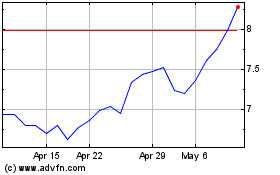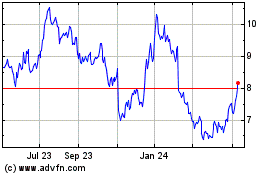Container Shipping Lines Cancel Sailings to Weather Coronavirus Storm
April 06 2020 - 5:02PM
Dow Jones News
By Costas Paris
Global container shipping lines have canceled more than 160
sailings over the past week as they try to maintain freight rates
in the face of billions of dollars in potential losses driven by
falling trade demand.
The service cancellations have grown from 45 last week to 212,
according to Copenhagen-based consulting firm Sea-Intelligence ApS,
a trend indicating that the summer peak season could be largely
muted and that the shipping lines that carry most of the world's
manufactured and retail goods expect the economic fallout from the
coronavirus pandemic to extend into the peak shipping season.
Sea-Intelligence estimates the biggest international carriers
will see combined losses ranging from $800 million to $23 billion
this year, depending on how they manage the economic impact from
widespread coronavirus-driven lockdowns.
The financial fallout for the shipping lines appears to be
relatively mild so far compared with that of airlines and other
transportation operators that depend on passengers.
But shipping lines are hunkering down with major national
economies wavering while their businesses halt operations,
factories idle assembly lines and job losses mount. Carriers
including Denmark's Maersk Line, Switzerland-based Mediterranean
Shipping Co. and Japan's Ocean Network Express Pte. Ltd. are trying
to guard against crashing freight rates on major trade lanes as
capacity increasingly outweighs demand.
"It's a developing storm," said Sea-Intelligence Chief Executive
Lars Jensen. "The challenge will be to carefully manage capacity
going forward so to prevent a freight rate collapse."
Mr. Jensen said industrywide losses could reach $23 billion if
liners embark in an all-out price war similar to that after the
2008 financial crisis, when freight prices fell to levels that
barely covered fuel costs.
"The rate collapse during the financial crisis was partly caused
by an inability to reduce capacity in a timely fashion," he said.
"The potential loss is of such a staggering magnitude that carriers
are highly likely to blank far more sailings in case we begin to
see rates slide too far."
Cancellations focused on Asia-Europe and trans-Pacific services
began to mount in January and February when the coronavirus began
to spread in China, pushing Beijing to bring economic activity to a
near standstill.
China is now pushing out cargo again, but demand has nosedived
with urban centers in the U.S. and Europe increasingly being locked
down. Some U.S. ports have pulled back operating hours at cargo
terminals because of the diminished demand.
Freight rates are currently around 20% below break-even levels
but have held relatively steady since the start of the year as the
blanked sailings restrained capacity and price-focused
competition.
"The trick is not to fall into the temptation to gain market
share by putting more ships into the water," said Mr. Jensen.
He predicts the pandemic will cut demand for container shipping
this year by about 10% overall, about the same decline as in 2009,
when the financial crisis unfolded disrupting world trade.
Denmark's A.P. Møller-Mærsk A/S, parent of Maersk Line,
suspended its 2020 financial guidance in March, saying the
coronavirus will have an unknown impact on its bottom line. Maersk
Line, considered a bellwether for global trade and the world's
biggest boxship operator, had earlier said it was expecting an
operating profit of $5.5 billion this year.
Write to Costas Paris at costas.paris@wsj.com
(END) Dow Jones Newswires
April 06, 2020 16:47 ET (20:47 GMT)
Copyright (c) 2020 Dow Jones & Company, Inc.
AP Moller Maersk AS (PK) (USOTC:AMKBY)
Historical Stock Chart
From Mar 2024 to Apr 2024

AP Moller Maersk AS (PK) (USOTC:AMKBY)
Historical Stock Chart
From Apr 2023 to Apr 2024
